Tennis star Nick Kyrgios on his mental health struggles and reputation
In a rare in-depth interview, tennis star Nick Kyrgios talks about his controversial reputation, mental health struggles and the softer side you don’t see on the court.
Stellar
Don't miss out on the headlines from Stellar. Followed categories will be added to My News.
Nick Kyrgios can sense people’s eyes on him as he loads a haul of fruit, bread, pasta and nuts onto the conveyor belt at his local supermarket in Canberra.
It’s the beginning of April, and while toilet paper has recently made its way back onto the shelves, there are still COVID panic-induced buying limits on what people can purchase. Yet Kyrgios’ trolley is overflowing.
“I bought $8000 worth of groceries in one hit and [people] are looking and I’m going, ‘It’s not for me!’,” recalls Kyrgios, who after a call out on his social media, was putting together boxes of household supplies to give out to strangers who were struggling financially as the pandemic took hold.
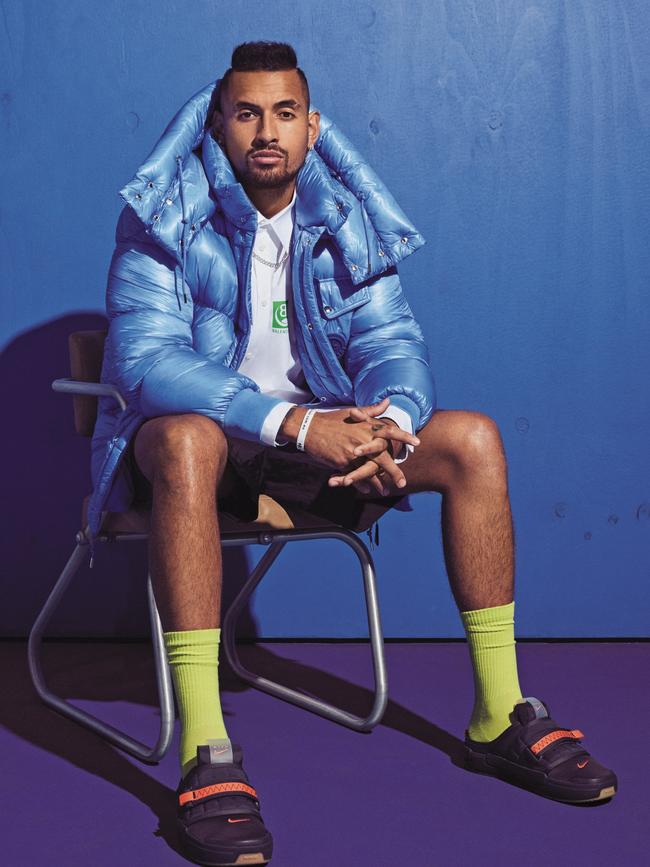
He then spent seven hours driving around the streets of suburban Canberra dropping off his care packages.
“One that stands out was a pregnant woman,” Kyrgios tells Stellar.
“She couldn’t leave her kids to go get groceries and she was really struggling, so I just dropped off a couple of boxes at her door. I didn’t do that for any media. I just genuinely took time out of my day because I thought it was the right thing to do.”
In a year that’s been filled with no shortage of surprises, perhaps one of the most unexpected developments has been the reversal of public opinion when it comes to the bad boy of Australian tennis.
So what’s behind the transformation? Perhaps it’s simply that, at last, the real Nick Kyrgios is standing up.
This unlikely second act kicked off just as 2020 dawned. Kyrgios first noticed a shift in the way people responded to him in January, after he pledged to donate $200 for every ace served over the coming month to the victims of the bushfires ravaging the country.
“I didn’t necessarily feel more welcome,” Kyrgios says of that time, as he sits down with Stellar in a hut outside the courts at Canberra Tennis Centre – the place he first learnt to hold a racquet.
“It’s more that the public in Australia were starting to understand what I was about, rather than just tennis.”
It’s a change that couldn’t have come at a better moment, given the 25-year-old hasn’t played a lot of tennis in a year upended by COVID. Instead, he’s spent most of his time at home – and, although Kyrgios has earnt more than $8 million in prize money over his career, home is still with his family, just a five-minute drive from the Tennis Centre.
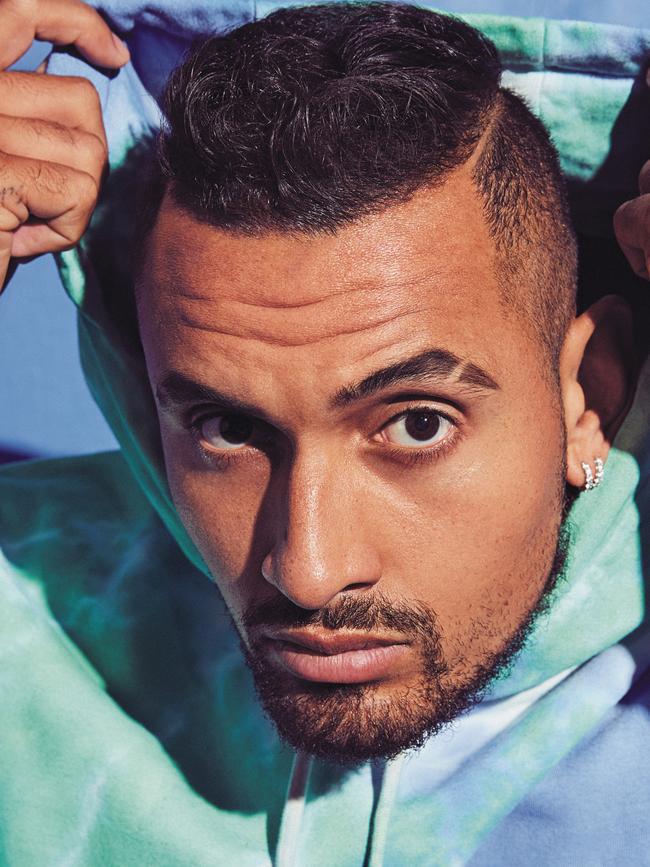
“I’ve lived there my entire life, at home with my mum and dad. It’s been awesome seeing them. It’s very laid-back. My parents are unbelievable cooks so there’s always a feast going on,” Kyrgios says, adding that they’ve adjusted their repertoire to account for his vegetarian diet, which he maintains for the sake of animal welfare.
“I’m in the same bedroom I was in as a kid. It hasn’t changed at all. I kind of grew apart from my family because I was travelling so much – it was hard to keep in contact. Being back, it’s almost felt like I’ve rekindled everything with my family. It’s been awesome.”
Sure, he’s hit the court a bit, but he’s also played video games in a room with walls that are still covered with SpongeBob SquarePants and basketball paraphernalia.
He’s also enjoyed spending time with girlfriend Chiara Passari, who he first revealed he was dating in June via an Instagram post.
“My days are so boring,” he says.
“I wake up, I get a coffee, I pick up my girlfriend from work and I train.”
Yet boring suits Kyrgios, whose life has been anything but since 2014, when he slammed his way into the spotlight as a 19-year-old wildcard at the Wimbledon Championships, beating world number-one Rafael Nadal and reaching the quarter-finals on his professional Wimbledon debut.
“On tour there’s a seven-month block when I don’t get to see my family or be home, so I’m really taking advantage of everything going on at the moment,” Kyrgios says.

“I don’t think people understand how lonely tennis can be. You’re out there on the court on your own. You can’t really talk to anyone. You have to figure things out for yourself. I did struggle with that.”
And we’ve witnessed that struggle, which has manifested itself in swearword-laden skirmishes with umpires and John McEnroe-style racquet smashing.
“I’ve always been an emotional tennis player,” Kyrgios says.
“When I was younger, if I was losing, I would cry or break a tennis racquet.”
But whatever demons Kyrgios may have been fighting also made themselves known through his tanking on the court.
Like Nadal, he beat greats Roger Federer and Novak Djokovic the first time he played them, but Australia’s tennis prodigy has been harshly criticised in the past for acting like he doesn’t want to play the sport.
And, he admits, there were times over the past two years when that was very much the case.
“When I was struggling – and it wasn’t just about tennis – there were moments when I was seriously depressed. I remember waking up in Shanghai one year and it was 4pm and I was still in bed, curtains closed. I didn’t want to see the light of day,” Kyrgios reveals.
“I felt like no-one wanted to know me as a person, they just wanted to get a hold of me as a tennis player and use me. I didn’t feel like I could trust anyone. It was a lonely, dark place. And things came from that.
“A lot of people were putting pressure on me, I put a lot of pressure on myself. I just lost joy for the game and I was spiralling out of control. I fell into depression because of the things I thought I had to be. I was afraid to go out and talk to people because I thought I’d let them down because I wasn’t winning matches.”
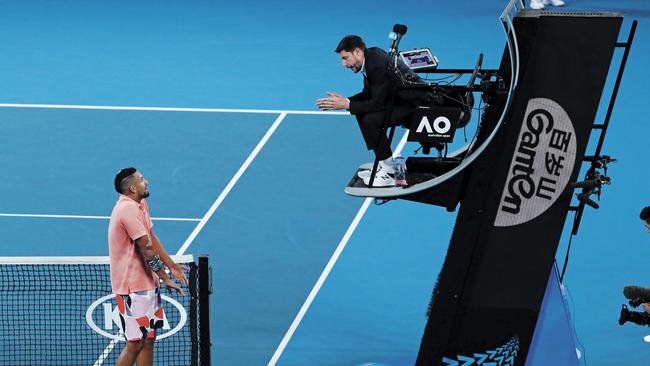
Kyrgios’ best friend and now-manager Daniel Horsfall, whom he first met playing basketball in high school, explains that toxic relationships – both professional and personal – weighed heavy on the sports star.
“He’d be overseas and call me at 3am in the morning, saying he wanted to come home, he wanted to quit,” Horsfall tells Stellar.
“It was so hard being on the other side of the world and feeling like I couldn’t help. I’d send videos of his dog to show him something positive.”
Along with seeking professional help, Kyrgios devised a plan to turn things around. He cleaned house with his management team, appointed his best mate as his point guard and decided to lean into his different approach to tennis: no coach, no structured training routine and no-one but him calling the shots.
“I want to prove you can do it your way,” he says now.
“Obviously, you have to work hard, but you can go your own path.”
But the biggest shift in Kyrgios’ approach has been putting the focus back on life away from the net, from teaching young players at coaching clinics to working on behalf of charities – alongside Serena Williams and Roger Federer, he raised $5 million for bushfire victims at the Rally for Relief Event at this year’s Australian Open.
“That was one of the most favourite nights I’ve ever had,” he says.
There’s also the NK Foundation, which was established in 2015 to provide sporting opportunities and a safe space for underprivileged youth in Melbourne. Asked what motivated him to launch the foundation, Kyrgios grows reflective.
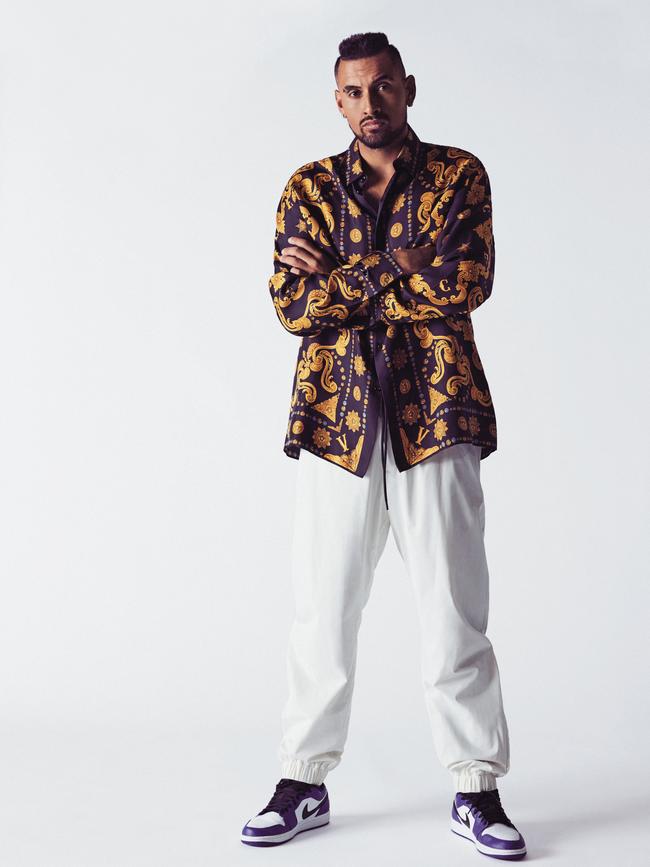
“I’ve lost my way a lot; I felt alone in a sea of people. I didn’t feel like I could talk to anyone about my feelings. I was fighting a lot of things and I didn’t feel like I had a home because I was always travelling. I don’t want to lose that feeling [of security] ever again – and I want to provide that to kids.”
Ironically, focusing on life off the court has brought a lightness to his approach when he’s on it.
“When I’m doing an interview after matches, they [might be] talking about my forehand and how badly I hit it and I’m like, ‘There are people around the world who don’t have access to clean water. I think it’s a bit of a joke that you’re asking about my forehand,’” he says.
“There are tennis players who live and breathe tennis, and that’s fine. I’m not saying that’s wrong or right. But when people say, ‘He doesn’t want it badly enough’ or ‘He’s not a champion’... Well, maybe. But I’ve reached a level of freedom in my life when I really don’t care what anyone thinks of me.”
That said, he does challenge the bad-boy reputation that’s come to define him.
“Yes, I do show my emotions more than others. And yes, breaking a racquet is bad, but it’s not terrible,” he says with a grin, adding that he was happy to recently hear the fines he had to pay for unsportsmanlike conduct – including the record-breaking $166,000 at last year’s Cincinnati Masters in the US – went to charity.
Still, he says, “I feel the ATP [the Association of Tennis Professionals, the sport’s governing body] and tennis society have gone harder on me than others.”
Asked why, Kyrgios surmises that his outspoken attitude challenges the establishment – in June, he called out “selfish” tennis players like Djokovic for holding events with poor social distancing, resulting in them contracting COVID – but he has no plans to dial it back in future.
“Tennis is a gentleman’s game and there’s a very tight-knit group in tennis who want the quiet between shots… but moving forward, if you look at the sport, it’s about entertainment.”
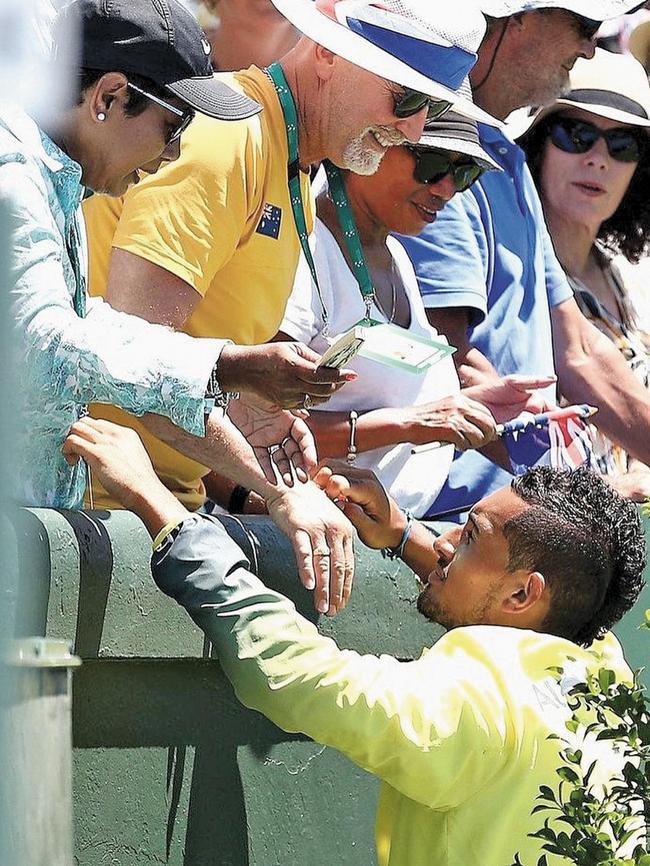
Horsfall says his mate will never admit it, but it hurt when he lost the support of his homeland: “Nick wears his heart on his sleeve and he’s never done anything that bad by Australia – he’s not part of a sex scandal, he’s not laundering money. It’s just when he does something Roger Federer wouldn’t do that he suddenly becomes a disgrace.”
As for the public shift in opinion?
“It’s not that he’s changed,” Horsfall adds.
“I just think everyone is realising he’s not as bad as they thought.”
Kyrgios is currently ranked number 44 in the world and says he doesn’t have designs on winning a Grand Slam.
“I don’t goal-set. I feel like if my mind and my body feel good, then let’s see where I can go,” he says.
Instead, his real motivation is to give back to the community and be a role model for children who lack the confidence to believe in their ability, much like he did when his parents first pushed him to pick up a racquet at the age of seven.
“I was overweight and didn’t like to go outside. I was very self-conscious and insecure, and I was crying and crying as Mum dragged me on to the courts. That’s my first memory of the game.”
It didn’t matter that he was a natural.
“I always feel a bit in my shell when I first get out on the court – to this day. I think about all those times when I was told by coaches and teachers that I wasn’t going to make it because of the way I looked and the size I was. It wasn’t easy hearing that. But you have to back your ability.”
He also doesn’t regret being made to give up playing basketball – his true sporting passion – to make way for the sport with which he has a love/hate relationship.
“If you take one small option out, you lose who you are today. I don’t regret anything. I feel like I have an amazing opportunity now to give back and help the community. I have a great platform. But I don’t regret any choice and any decision my parents pushed me towards.”
Horsfall believes that if Kyrgios can maintain a healthy body and, more importantly, a healthy mind, then a top-five world ranking awaits. And if he does get there it won’t be because he stopped smashing racquets.
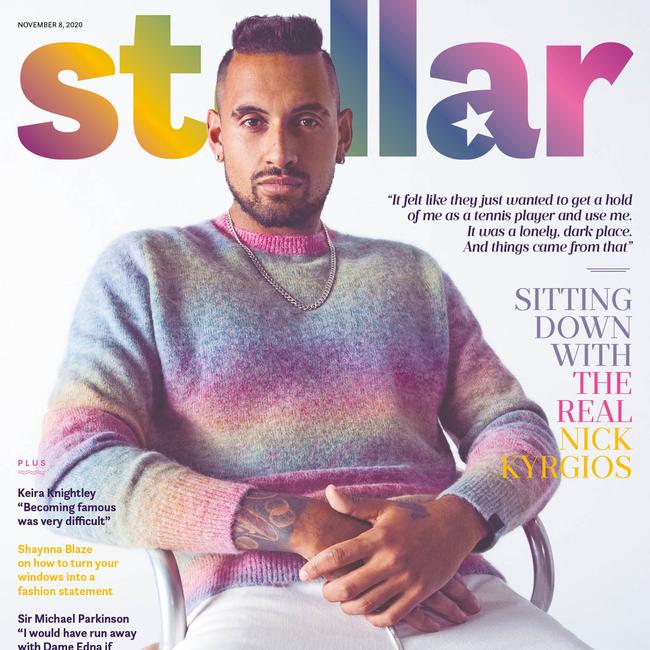
“I know [people] want to see something they’re not going to see at an everyday tennis match,” Kyrgios says.
“Whether it’s a shot I play or something I say, I’m consciously trying to keep people on their toes. I’m definitely two different people on and off the court.”
The time he’s spent away from competition also makes Kyrgios excited to get back into it, which will hopefully be this summer if the Australian Open takes place.
“Nothing beats playing in some of the best parts of the world against tough opponents and doing all the work off the court to have success. I’m definitely missing it. But I don’t live and breathe tennis,” he says.
“I know my tennis career will come to an end, and I’m OK with that. I’m not going to say I could have worked harder, played more tournaments, done this or that. I love being at home with my family and my girlfriend, and working with my foundation and helping the community. There are plenty of other things I love doing.”
MORE STELLAR
Michael Clarke on his first Father’s Day as a single dad
Magda Szubanski talks fat-shaming, COVID politics and cancel culture
More Coverage
Originally published as Tennis star Nick Kyrgios on his mental health struggles and reputation





